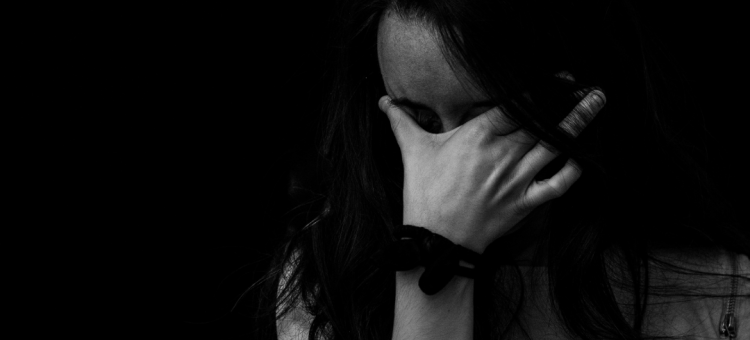What do you do when your friend is upset? That’s easy right? You give them a hug, or a compassionate ear. But what if the situation is a bit more serious? What do you do when your friend is self-harming? It’s certainly a more challenging situation, but as their friend, there are a few things you can do to help.
What is Self-Harm? Why do People do It?
Stress is something that we all deal with in our lives, but some of us have a harder time dealing with it than others. For those of us with anxiety or other mental health disorders, our anxiety can feel so great that we turn to some less-than-good coping mechanisms.
One of these coping mechanisms is self-harming. Self-harm or self-injury is when someone purposefully injures themself in response to stress. For this person, the intent is not to end their lives, but rather to relieve the tension and convey the distress that they are feeling.
In general this behaviour is pretty rare, only 1-4% of the population do it, but when it comes to teens with anxiety this number increases dramatically to 14-39%!
The most common types of self-injury are:
- Cutting or scratching the skin
- Hitting oneself
- Biting or pinching the skin
- Burning oneself
Not all teens that experience anxiety will self-harm, but those that have a history of risk-taking behaviour, feel like they lack support from parents or friends, and engage in other unhealthy lifestyle habits are more likely to try and continue self-harming.
Signs of self-injury
As self-harming is often done in secret and can be difficult to detect, it is vital that you know the signs.
If you are worried about someone close to you engaging in self-injury you should be on the lookout for signs such as:
- Changes in behaviour. Do they seem more withdrawn than usual? Have they stopped normal social activities?
- Wearing clothing that is inappropriate for the weather—like long-sleeves and pants when it is hot outside.
- Unexplained burns, bruises, or cuts, or injuries that seem to occur frequently
- Signs of scarring
- Items that could be used for self-harm (razors, lighters, etc.) kept on their person or in their bedroom
What Do You Do When Your Friend is Self-Harming?
It can be difficult to see your loved one in pain, and even harder to know what to do about it. If you suspect your friend of self-harming there are a number of things you can do to approach the situation and assist them in getting professional help.
Education
Before approaching them learn more about self-injury and try to put yourself in their shoes. What might be contributing to their feelings of anxiety? How would that situation make you feel?
Avoid judgment
Try to stay neutral about the situation and avoid condemning their actions. If they had a better way to deal with their feelings, they would do it. Being judgmental does nothing to help and will probably make them feel worse.
Focus on the issue, not that act.
Self-harming is a symptom of a larger problem. Stay focused on the bigger issue at hand be it anxiety, depression or something else, and not on the self-harming behaviour.
Stay positive.
What your friend needs most is your unconditional support. Let them know that you’re willing to listen without forcing them to talk, and support them with coming up with healthier coping mechanisms. If they express interest in talking to a professional, help them access those supports.
Be realistic
It is unlikely that the self-harming behaviour will stop overnight. Make sure your loved one knows that health is a journey and that you will love and support them no matter how long it takes.
Don’t forget about you
Seeing and hearing someone you love in pain can be hard on you too. If you find the information you are hearing distressing, make sure you talk to someone about it. Never forget to take care of yourself first.
How to Treat Anxiety and Self-Harm.
There are a few different methods that can be used to treat anxiety and self-harming behaviours, and it may take a few tries to find the right one.
Cognitive Behavioural Therapy (CBT)
CBT focuses on how your thoughts and behaviour influence your mood. It is often the first-line treatment for anxiety and depressive disorders. CBT may benefit a person who self-harms by helping them recognize the thoughts and feelings that trigger the behaviour. You and your counsellor will work towards changing those troubling thoughts and creating new coping mechanisms.
Dialectical Behaviour Therapy (DBT)
Oftentimes, people with anxiety have a very rigid tought-patterns and views of the world, and DBT is a way to challenge those patterns and encourage more flexible ways of thinking. Practicing DBT can also help with things such as problem solving and how to accept and cope with difficult feelings.
Self-Help
Certain lifestyle habits are shown to help with anxiety and depression. Making sure you eat well, get enough sleep, exercise regularly, and take part in activities you enjoy can have a huge impact on your mood.
Connect Can Help
Connect Counselling and Therapy Society offers free, responsive mental health counselling for youth who cannot afford to pay for services. We provide counselling for those who are struggling with issues of family change, trauma, anxiety and depression. Group programs and individual counselling can help them develop a greater degree of self-awareness, new and healthy coping strategies, and a better understanding of themselves and others.
If you are interested in taking part of one of our counselling services contact us at 250-860-3181 or send us a message.
If you are in need of immediate assistance call 911.
